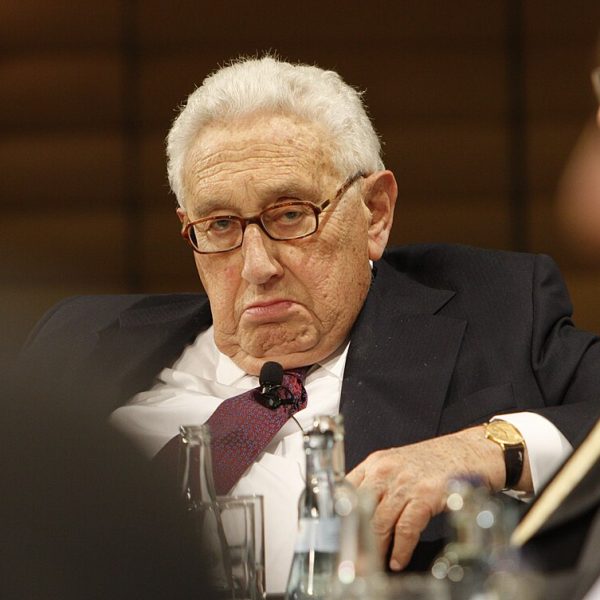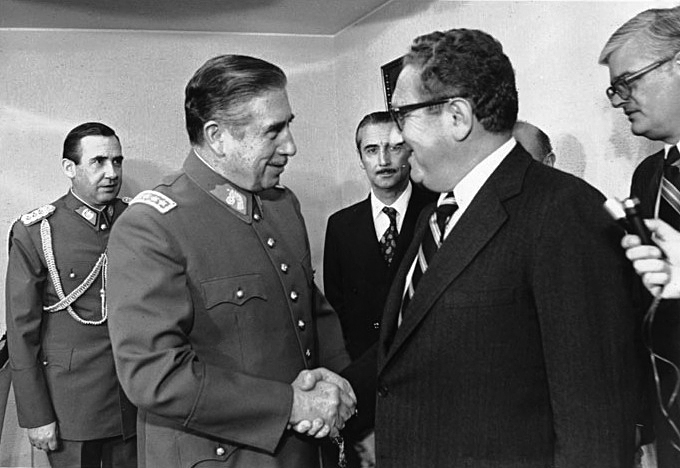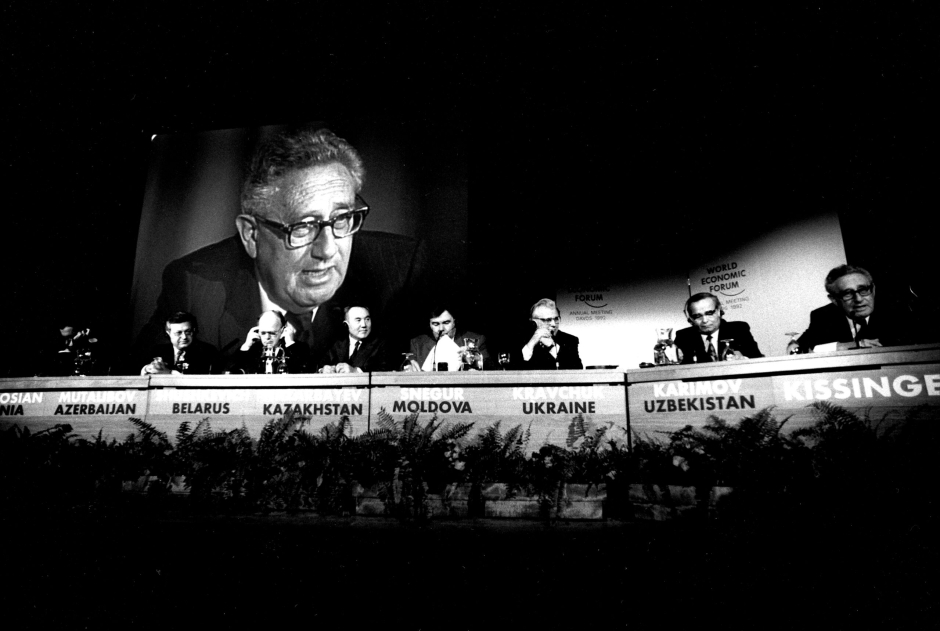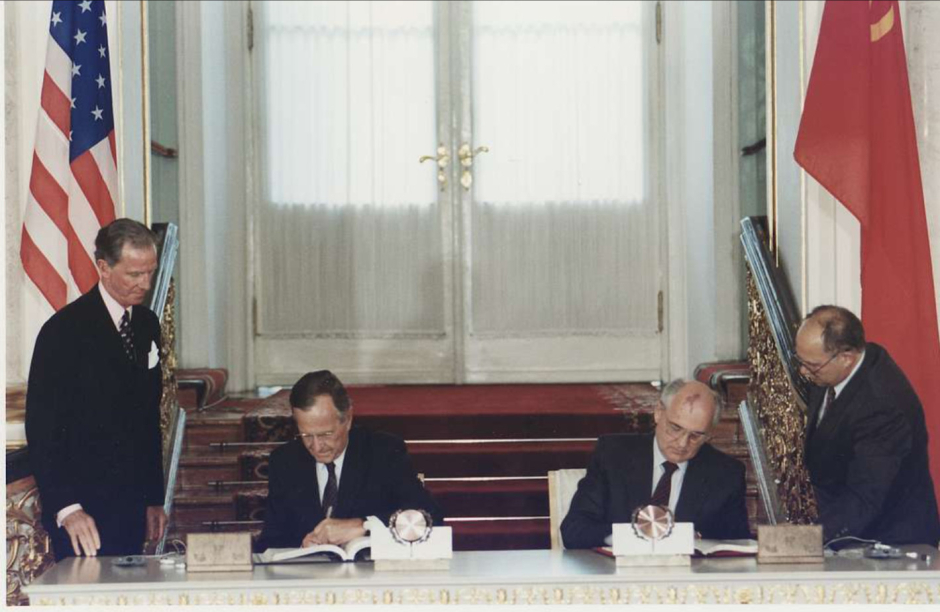
The United States' most notorious diplomat was behind key nuclear arms control treaties with the USSR that kept a lid on the possibility of catastrophic nuclear exchange.
Contact us: infostrategic-culture.su
Henry Kissinger, recognized by many as one of the most influential practitioners of American foreign policy ever, died on Wednesday at the age of 100.
Much is being written about the former national security advisor and secretary of state over the next days and weeks, some of it glowing, much of it condemning. I will leave it up to others to decide how they want to characterize the man and his life. As for me, I will focus on the brief moments of intersection I had with Secretary Kissinger, and how those impacted my life and my work.
My first brush with Henry Kissinger was as a child living in Hawaii. My father was a career Air Force officer, and in the early 1970s he was assigned to the Headquarters, Pacific Air Force, where he was involved with a variety of logistics-related assignments, including helping facilitate the transfer of U.S. military equipment to the Vietnamese Air Force as part of the Nixon administration's "Vietnamization" program, which sought to transfer responsibility for the defense of South Vietnam from the U.S. military to Vietnamese armed forces.
In this regard, my father made several trips to South Vietnam. Two things stood out from these experiences: one was my father's disgust at the lies being told by senior U.S. military officers who would issue glowing reports about the progress being made after spending less than 48 hours in South Vietnam, most of that time being spent in bars and nightclubs.
My father had been deployed to Vietnam in 1965-66 as part of the 10th Air Commando Squadron - the "Skoshi Tigers" - responsible for bringing the F-5 fighter to Vietnam, testing it out as a combat platform, and transitioning the F-5 to the South Vietnamese Air Force. He knew more than a little about the realities of turning over modern weapons systems to a military culture unaccustomed to such complexity.
While the U.S. Air Force was able to employ the F-5 in both an air-to-air and air-to-ground role in South Vietnam, the South Vietnamese never really grasped how to properly use the capabilities inherent in the airframe. This was true in 1966, when my father left South Vietnam for the first time, and it remained the case in 1973-74, when he was involved in implementing "Vietnamization."
But I remember his anger when speaking of the numerous cables that would come in from Washington, D.C., and in particular from National Security Advisor Henry Kissinger, directing things to be done. "Kissinger Sends," the cables would read. "Who the hell is Henry Kissinger?" my father would say. "And why the hell are we listening to him? He's not in our chain of command." (Scott Ritter discusses this article on Ep. 118 of Ask the Inspector.)
Later, from February through April 1975, as the South Vietnamese military crumbled before the North Vietnamese armed forces advancing on Saigon, the absolute failure of the "Vietnamization" program -which Kissinger championed - became manifest.
That summer my family played host to a South Vietnamese refugee family that had fled for their lives during the fall of Saigon. We were good hosts, but my father could barely look the family in the eyes given the shame he felt at having been a part of a system that had betrayed them so much.
Godfather of U.S.-Soviet Arms Control
Henry Kissinger, former U.S. secretary of state, chairing a "new partners" panel with former U.S.S.R. leaders in Davos, Switzerland, 1992. (World Economic Forum, CC BY-SA 2.0, Wikimedia Commons)
Over the years, I would read much about Kissinger and his work. While a senior in college, I devoured Seymour Hersh's The Price of Power, a devastating exposé of the dark realities associated with the Nixon administration's formulation and implementation of national security and foreign policy.
In my mind, the name Henry Kissinger became synonymous with the illegal bombing of Cambodia, the assassination of Salvadore Allende, and the degree to which a nation's reputation could be sullied by the actions of one man.
To be honest, as I entered the U.S. Marines after graduating college in 1984, I didn't give Kissinger much thought - he was, from my perspective, a relic of the past, a bad national nightmare who, like his boss, Richard Nixon, was fading into the pages of historical irrelevance.
And then, in early 1988, everything changed. I was taken from the deserts of southern California, where I had been perfecting skills associated with the Marine Corps mission of destroying the enemy through firepower and maneuver., I was dispatched to Washington, D.C., where I was made part of a team that would implement inspection tasks associated with the implementation of the Intermediate Nuclear Forces (INF) treaty.
As I learned more about the treaty, and its relationship to the history of U.S.-Soviet arms control, the name Henry Kissinger kept popping up. Kissinger, it turns out, was the Godfather of U.S.-Soviet arms control, the man who crafted the anti-ballistic missile treaty, considered one of the foundational agreements that defined the strategic relationship between the U.S. and Soviet Union.
He was also the driving force behind the policy of détente between the U.S. and Soviet Union, which led to an end to the nuclear arms race and heralded in the Strategic Arms Limitation Talks (SALT) which eventually turned into the Strategic Arms Reduction Treaty (START).
The INF treaty was a byproduct of the vision set forth by Kissinger. I often speak of the importance of the INF treaty in preventing nuclear war, and remain convinced that without it, a nuclear conflict between the U.S. and Soviet Union was inevitable.
'Foreign Policy Expert' Reappears
US President George Bush and USSR President Mikhail Gorbachev sign the Strategic Arms Reduction Treaty (START) in Moscow 1991. (National Archives via Creative Commons)
It turns out that without Henry Kissinger, there probably would have been no INF treaty, no START treaty, no SALT agreements, no ABM treaty - no arms control.
Without Henry Kissinger, there would very likely have been a nuclear war.
Following my assignment as an arms inspector in the Soviet Union, I returned to the Marine Corps, where, from August 1990 until August 1998, my life was defined by Iraq - first through Operation Desert Shield/Desert Storm, and then later, as a weapons inspector with the United Nations tasked with overseeing the disarmament of Iraq's weapons of mass destruction programs.
Once again, Kissinger disappeared into the background, only to reappear in the summer of 1998 as one of the "foreign policy experts" who articulated openly about the need to remove Saddam Hussein from power.
Following my resignation from the United Nations in August 1998, I received an invitation from Teddy Forstmann, one of the founders of the private equity corporation Forstmann & Little, to fly to Aspen, Colorado, to speak as part of an annual policy discussion forum that brought together the "best and the brightest" in the world under a single roof where the issues of the day would be addressed. Among the notable people present was none other than Kissinger.
I had the opportunity to rub elbows with him on several occasions during the Aspen forum. We talked, of course, about Iraq - this was pre-9/11, pre-WMD fabrication, where the issues revolved primarily around Saddam Hussein and the threat he posed to regional peace and security.
But most of all we talked about arms control and the importance of preserving the legacy of disarmament that had been started under the Nixon administration, but which seemed to be slipping away under Bill Clinton's watch.
I last saw Henry Kissinger in May 1999, at the White House Correspondent's Dinner. He was attended to by a retired Secret Service officer whom I had met at the Aspen event. After the dinner and speeches, he approached my table and told me Mr. Kissinger wanted to speak with me. I was ushered to a side room, where the famous former diplomat was waiting. "I wanted to continue our conversation," Kissinger said. And we did.
The details of what we talked about, filled with the nuances of science, technology, and how they interface with the human condition, are unimportant at this juncture. The point being made here is that for a solid 30 minutes, I had the undivided attention of one of the foremost thinkers of our time when it came to diplomacy and arms control. We talked about the past, we talked about the present, and we both worried about the future.
I have been in the presence of great men, and the one thing that strikes me about most of them is that they love to hear themselves talk. Don't get me wrong - Henry Kissinger, too, was in love with the sound of his own voice - he had more than earned the right.
I was deeply impressed with the intelligence of this man. But what impressed me the most was his willingness to listen, and to carefully weigh his words when responding to what I had to say. While I was clearly the junior partner in this discussion, I was not made to feel irrelevant.
Far too soon, the Secret Service man appeared, and gestured to the door, where a long line of illuminati was waiting to have an audience with the Dean of American Diplomacy. My time was up. We shook hands. "We will talk again," Henry Kissinger said in parting.
"He likes you," the Secret Service agent told me as we exited the room. "You were the first person he wanted to speak to tonight."
Kissinger's Complex Legacy

Chile's General Augusto Pinochet, left, greets US Secretary of State Henry Kissinger in 1976. (Ministerio de Relaciones Exteriores de Chile, CC BY 2.0, via Wikimedia Commons)
I was honored and looked forward to our next conversation. I even bought a copy of his 1994 masterpiece, Diplomacy, and put it on my bookshelf in anticipation of getting the author to sign it one day.
That day never came. Henry Kissinger passed away on Nov, 29, 2023, at the age of 100.
One of his last official acts was to travel to China, where he used the good reputation he had built from his orchestration of Nixon's historic outreach in 1972 to try and find some common ground between the U.S. and China today that could be used to repair a very strained relationship.
There will be those who, with reason, choose to remember Henry Kissinger harshly because of policies he formulated and implemented that could, with just cause, be characterized as crimes against humanity. Kissinger once joked, "The illegal we do immediately. The unconstitutional takes a little longer."
It wasn't funny because it was true.
"Who the hell is Henry Kissinger?" my father used to angrily ask. The answer, it turns out, is not so simple.
There is much to be critical of the man, and nothing he did should be kept secret from the people he ostensibly served.
But I will always remember the intelligence and kindness of the man, and the fact that the policies he shaped helped save the world from nuclear annihilation. Next week there will be a gathering of veterans from the INF treaty in Washington, D.C. We will toast those who have gone before us - including, just this past month, Roland Lajoie, the first director of the On-Site Inspection Agency and the man who made verification of the INF treaty possible.
I will offer a separate toast, in silence, to Henry Kissinger, because I know, in my heart of hearts, that for all his many faults, if it weren't for him, none of us would be here today.

